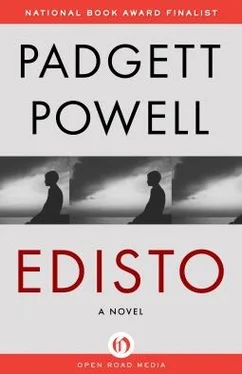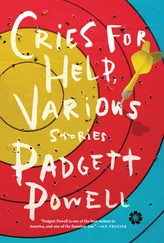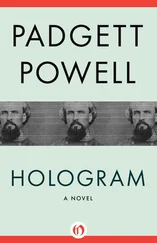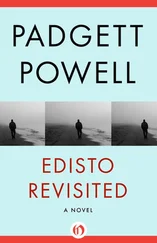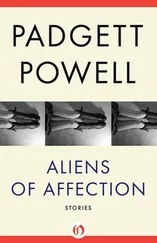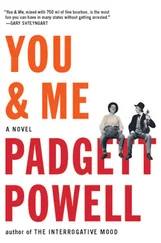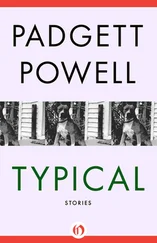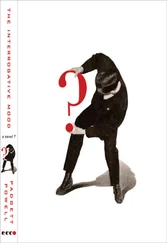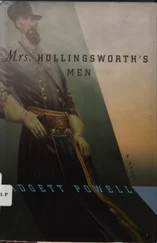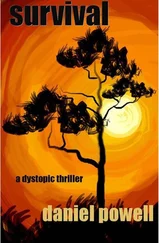"It ain’t nothing but a bunch of rowdy niggers out there. You, come on the back."
I went with her. I saw Jake call his momma to chain the dog. I went by the worms and a trail that let out down the road. I remembered all this walking in the whipping dark. The Cabana was lit up like a chandelier, crystal prism wobbling in the wind. At the shack Taurus was snifting Old Setter with the window open on the beach side, watching the ghostly waves chomp. When it’s dark you hear everything but only see a white roughness at the water’s edge and sometimes a glassy curl out farther, enough to place the wave for you and let you count toward its break. Once like this I saw a shark tearing light out of the water, blasting loads of mullet in phosphorous fires in all directions, like the shark was a bomb and the mullet hot shrapnel.
But that night it was simpler. We just whiled it away. I should have known from the tone it was the end of us, like they say on a soap opera. Taurus asked me out of the blue, across the white enamel table and over our two amber oyster-jar snifters, which we held like cups of mission soup, what were Georgia and Alabama and Louisiana like.
I said Georgia was convicts and palmetto, but my uncle built a lot of roads in the obscure parts, which they said were good roads still, old-concrete-slab-type roads with weeds in the expansion joints and not all this asphalt-lobby shit on them. I said Alabama was a place the Doctor said the air was different, but it sounded like the famous Bear Bryant had one half and the famous George Wallace the other and you took your choice. I’d also heard there were large shellcracker in Birmingham, somehow, but who could say if they were the coach’s or the governor’s? But Louisiana I said was It. I heard an old Mississippi lady tell of it once as "rich, old Louisiana." She said, "There’s a lot of money in that state. She’s very rich." And she wasn’t talking about new money, or old money, or even money itself, but some other richness about a place that is not necessarily all tied up in the bank. And then I told him how the books seemed to bear this out. You had the Kingfish book with that bodacious beginning, all dug up right there at Baton Rouge — it must be the place, if there’s one left.
"Why do you ask?" I said after a while.
"Why not?"
We thought this one over.
"Well. .” I said, highly articulate.
"Well, yes," he said. He looked around the room and back at his jar of liquor.
He meant Theenie was coming back, which meant Order, Restoration, including in its ramifications the Progenltor’s reclamation of the Barony and Penelope, and my riding a school bus regularly, and he meant swept floors at the house again, an end to custody junkets, an end to surrogate daddies, a beginning of baseball. I guess he hadn’t heard we would go to Hilton Head.
"I’m thirteen years old in eight months," I told him. He nodded.
"Little League already has stars," I said.
"Flashes in the pan," he said. I guess I had told him before about my baseball training, before Daddy left. The Doctor takes me to a child psychiatrist at three to see why I can’t read, and when we get home, Daddy puts me between third and second to see why I can’t stop grounders. I failed the first test because I saw a relationship between an envelope and a cantaloupe and I failed the second because I saw a relationship between a crisply peppered grounder and a smashed face.
"Baseball," I said. "I see too much.”
"It’ll come in handy."
I think he meant the girl stuff. Even I knew that Diane Parker wasn’t going to have much truck with worms and weenie-arms.
I wasn’t really all that reserved about it, about grounders and girls and the end of coroners. That would put an end to listening to snout-first intrusions by the Doctor’s suitors, to the suitors themselves, to the requisite Boy Act to get rid of them, and I could hear the sweet groaning rocks of the nuptial bower restored, and Theenie would be back and we could have talks, and she could do linen and run the vacuum and worry about the gubmen and make more pound cakes, and maybe get over her fear.
"Do you think she’s your grandmother?" I said.
He had his liquor swirling in the jar on the table with some sand under it making a grinding noise.
"I hope so," he said, grinning.
“You hope so?"
"Sure,” he said. "What about you?"
What about me? I thought.
"Yeah, me too," I said, not at all sure what I meant, but the answer was faster than motive, and it was honest, only I didn't know what I meant. We looked out the window we had cut in the wall of common sense. We did not see any sharks tearing electric mullet from the Atlantic, only ghosts of waves making large noise. He was going to leave. He would drive back up the hard road through those odd inland pockets of salt-smelling air, and the Hddlers would come out and wave their ivory swords and then duck quickly back into their mysterious holes.
A Farewell to a Shack
The next morning I found the ground moon-pocked by the night’s hard rain. Fiddlers were punchy, running dizzy. I got the mullet poles and took them to Theenie’s shack, even though I knew he’d be gone. I took them to fend off the future. From the beach I could see the green shutters were up and tight. The rain had made the air very cool and the sand squeak. Only my face felt greasy in this new world.
He was gone. A note said, Louisiana. Took your advice. Present under bed. I found an old wooden stereo-viewer with a mahogany viewing hood and square glass lenses and a little wire rack on a sliding bridge for the cards, which you move like a trombone to focus. There was one card and I put it in. It was almost a headache while I slid the thing back and forth, then it was two separate pictures, each the same, of chickens in the air, and then suddenly they fell together and the scene was forty feet deep and the chickens were glorious multicolored cocks with brass spurs. These wild spectators were watching them, their eyes all the colors of the cocks’ feathers. I took the card out and looked at it. It was separate and simple again. It was something.
I put the viewer in a box of Theenie’s things, what I guessed were her dearest things — a tobacco-colored Jesus on a felt base, and some funny little scarf things she folded up and left all over the place, and Reader's Digests with religious bookmarks in them. I had packed all that up right after she left.
They were things would help her move in at Hilton Head. Not that she’d need much in the way of seed to take roots, because wherever we wound up in Hilton Head would be strictly uptown for her. She liked progress. A shack like hers was quaint only to people like me. To her it was acceptable for its time, and then it was something forever in the past, just like the W.P.A. was a neat time only for people who never saw the Depression.
She gave me a lecture on brooms and vacuum cleaners once. She had a house full of hardwood floors to do, to sweep, and she would not use a broom, which was efficient over a vacuum designed for carpet.
"I swep enough," she’d say. “All my life."
"But Theenie, it’s faster with a broo—"
"What choo know? I’m the one does it."
So she’d plug up this Kirby made of chrome and this most wonderfully supple, flesh-like rubber — must have cost about a thousand dollars, and we didn’t buy it. It showed up the day she came.
"Simons, you Simons?" she said, the first words she ever said to me. "If you was a good boy to your Theenie, you go up the road to the bush by the gate and get my valcum."
It spaced me out. "Do what?" To my theeny?
"Here.” She handed me a piece of cloth. "There’s a piece of this on the bush. Hurry up."
That was our introduction. I was already six years old. But she takes credit for raising me, all the same. And I found the Kirby stashed in the bushes by the hard road.
Читать дальше
